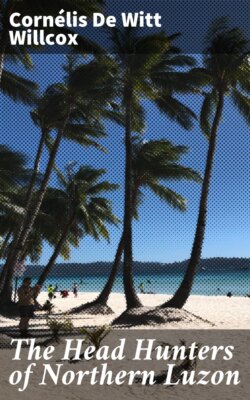Читать книгу The Head Hunters of Northern Luzon - Cornelis De Witt Willcox - Страница 9
На сайте Литреса книга снята с продажи.
Chapter V.
ОглавлениеTable of Contents
Aritao.—Bubud.—Dúpax.—Start for Campote.
We all slept in the school-house, for Boné is a Christianized village, and next day, April 28th, made a late start, for it was to be a day of easy stages. By nine o’clock, passing through an undulating champaign country, we reached Aritao, being met at the outskirts by gansa-beaters and also by the Christian school-children with medieval-looking banners, and all in their best bibs and tuckers; the heathen and the Christians mingling apparently on the best of terms. Aritao is an old town, now much decayed, but showing evidences of former affluence. It has a brick church, the bells of which were rung on our approach.
As there is some Government here, of course we had to pay a visit of ceremony, and were accordingly received by the presidente and other dignitaries in an upper chamber, the little children with their banners massing around the gate of the house and forming a really pretty picture. When we were all in, the presidente made the Governor-General and his suite a dignified speech of welcome, very well done, to which Mr. Forbes made answer in fluent and pretty good Spanish. Bubud was then passed about—but this is going too fast! Bubud (called tapuy elsewhere) is an institution in the parts where we now were, and I had been hearing of it for days. It is the native (Ifugao) name of a drink produced by the fermentation of rice, a drink that varies in color and in flavor, according to the care taken in its make, but nearly always agreeable to the palate and refreshing. That offered us to-day was greenish yellow, slightly acid and somewhat bitter from the herbs added. Unfortunately, it will not bear transportation, but we made up for this by carrying off personally as much as was convenient. It had a happy effect on my pony, too: all the way to Aritao he had been slower than the wrath to come, but from this on he showed life and spirit; in fact, he danced and pranced through every town we crossed for some days afterward. I always meant to ask if some one had given him any bubud at Aritao, during the speech-making; on reflection I am inclined to doubt it, but at any rate, in honor of the circumstances, he was known as Bubud the rest of the trip.
A short ride through the charming, smiling country (part of it might have been France), over a really good road most of the way, brought us to Dúpax. On the way we were met by some of the American officials of the province, among them Mr. Norman Connor, Superintendent of Education (Yale, 1900), and by two Belgian priests, De Wit of Dúpax and Van der Maes of Bayombong. The natives met us, all mounted, with a band, so that we made a triumphant entrance, advancing in line to the presidente’s house, while the church-bell pealed out a welcome.
Dúpax must, like Aritao, have been a point of some importance in the past. It has a large brick church with a decidedly Flemish facade, and a detached pagoda-like belfry. Its streets are overgrown with fine soft grass, and its houses had somehow or other an air of comfort and ease. Here we made quite a stop, first of all quenching our thirst with bubud, beer, cocoanut milk, anything, everything, for we had ridden nearly all the way so far in the sun. We then sat down to an excellent breakfast, and smoked and lounged about until two, when fresh ponies were brought, and we set off on a side trip to Campote, where we were to have our first contact with the real wild man, the Ilongot.1
1 Dr. Barrows, in the “Census of the Philippine Islands,” Vol. I., p 471, says that the etymology of this word is unknown. As it seems to mean “people of the mountains,” it is not unlikely to be a form of “Igolot,” by metathesis, as it were.
